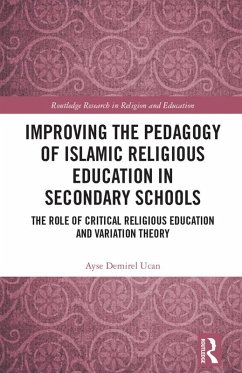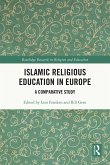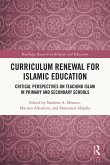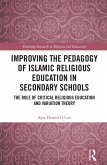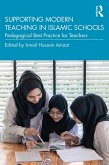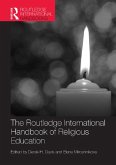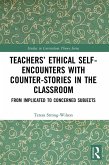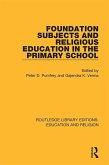Ayse Demirel Ucan
Improving the Pedagogy of Islamic Religious Education in Secondary Schools (eBook, PDF)
The Role of Critical Religious Education and Variation Theory
42,95 €
42,95 €
inkl. MwSt.
Sofort per Download lieferbar

21 °P sammeln
42,95 €
Als Download kaufen

42,95 €
inkl. MwSt.
Sofort per Download lieferbar

21 °P sammeln
Jetzt verschenken
Alle Infos zum eBook verschenken
42,95 €
inkl. MwSt.
Sofort per Download lieferbar
Alle Infos zum eBook verschenken

21 °P sammeln
Ayse Demirel Ucan
Improving the Pedagogy of Islamic Religious Education in Secondary Schools (eBook, PDF)
The Role of Critical Religious Education and Variation Theory
- Format: PDF
- Merkliste
- Auf die Merkliste
- Bewerten Bewerten
- Teilen
- Produkt teilen
- Produkterinnerung
- Produkterinnerung

Bitte loggen Sie sich zunächst in Ihr Kundenkonto ein oder registrieren Sie sich bei
bücher.de, um das eBook-Abo tolino select nutzen zu können.
Hier können Sie sich einloggen
Hier können Sie sich einloggen
Sie sind bereits eingeloggt. Klicken Sie auf 2. tolino select Abo, um fortzufahren.

Bitte loggen Sie sich zunächst in Ihr Kundenkonto ein oder registrieren Sie sich bei bücher.de, um das eBook-Abo tolino select nutzen zu können.
This timely book focusses on the central issues and questions which emerge in relation to the teaching and learning of Islam in confessional and constructivist religious education.The text also explores the challenges faced by Muslim pupils in connection with secularism and radical Islam
- Geräte: PC
- ohne Kopierschutz
- eBook Hilfe
- Größe: 1.09MB
Andere Kunden interessierten sich auch für
![Islamic Religious Education in Europe (eBook, PDF) Islamic Religious Education in Europe (eBook, PDF)]() Islamic Religious Education in Europe (eBook, PDF)39,95 €
Islamic Religious Education in Europe (eBook, PDF)39,95 €![Curriculum Renewal for Islamic Education (eBook, PDF) Curriculum Renewal for Islamic Education (eBook, PDF)]() Curriculum Renewal for Islamic Education (eBook, PDF)40,95 €
Curriculum Renewal for Islamic Education (eBook, PDF)40,95 €![Improving the Pedagogy of Islamic Religious Education in Secondary Schools (eBook, ePUB) Improving the Pedagogy of Islamic Religious Education in Secondary Schools (eBook, ePUB)]() Ayse Demirel UcanImproving the Pedagogy of Islamic Religious Education in Secondary Schools (eBook, ePUB)42,95 €
Ayse Demirel UcanImproving the Pedagogy of Islamic Religious Education in Secondary Schools (eBook, ePUB)42,95 €![Supporting Modern Teaching in Islamic Schools (eBook, PDF) Supporting Modern Teaching in Islamic Schools (eBook, PDF)]() Supporting Modern Teaching in Islamic Schools (eBook, PDF)37,95 €
Supporting Modern Teaching in Islamic Schools (eBook, PDF)37,95 €![The Routledge International Handbook of Religious Education (eBook, PDF) The Routledge International Handbook of Religious Education (eBook, PDF)]() The Routledge International Handbook of Religious Education (eBook, PDF)51,95 €
The Routledge International Handbook of Religious Education (eBook, PDF)51,95 €![Teachers' Ethical Self-Encounters with Counter-Stories in the Classroom (eBook, PDF) Teachers' Ethical Self-Encounters with Counter-Stories in the Classroom (eBook, PDF)]() Teresa Strong-WilsonTeachers' Ethical Self-Encounters with Counter-Stories in the Classroom (eBook, PDF)39,95 €
Teresa Strong-WilsonTeachers' Ethical Self-Encounters with Counter-Stories in the Classroom (eBook, PDF)39,95 €![Foundation Subjects and Religious Education in the Primary School (eBook, PDF) Foundation Subjects and Religious Education in the Primary School (eBook, PDF)]() Foundation Subjects and Religious Education in the Primary School (eBook, PDF)26,95 €
Foundation Subjects and Religious Education in the Primary School (eBook, PDF)26,95 €-
-
-
This timely book focusses on the central issues and questions which emerge in relation to the teaching and learning of Islam in confessional and constructivist religious education.The text also explores the challenges faced by Muslim pupils in connection with secularism and radical Islam
Dieser Download kann aus rechtlichen Gründen nur mit Rechnungsadresse in A, B, BG, CY, CZ, D, DK, EW, E, FIN, F, GR, HR, H, IRL, I, LT, L, LR, M, NL, PL, P, R, S, SLO, SK ausgeliefert werden.
Produktdetails
- Produktdetails
- Verlag: Taylor & Francis eBooks
- Seitenzahl: 262
- Erscheinungstermin: 4. September 2019
- Englisch
- ISBN-13: 9780429621215
- Artikelnr.: 57628647
- Verlag: Taylor & Francis eBooks
- Seitenzahl: 262
- Erscheinungstermin: 4. September 2019
- Englisch
- ISBN-13: 9780429621215
- Artikelnr.: 57628647
- Herstellerkennzeichnung Die Herstellerinformationen sind derzeit nicht verfügbar.
Ayse Demirel Ucan is Researcher in the Religious Education Department at Marmara University, Turkey.
List of tables
Acknowledgements
Chapter 1
Introduction
Problems of teaching Islam in confessional and constructivist religious
education
Absence of diversity in the Islamic Religious Education curriculum
A new theoretical and pedagogical approach to Islamic Religious Education
The aim of the study
Structure of the book
Chapter 2
Critical Realism and Islam
Critical Realism
Religion, God and Critical Realism
Critical Realism as applied to Islam
Critical Realism as 'underlabouring' Islamic Religious Education
Chapter 3
Applying the Framework of Critical Religious Education and Variation Theory
to Islamic Religious Education
Critical Religious Education
Phenomenography
Variation Theory
Learning Study Model
Chapter 4
Research Methodology
Research Approach
Implementaion of learning studies
Sampling of research participants
Data collection tools
Data analysis
Ethical considerations and trustworthiness of the study
Reflexivity
Chapter 5
Implementation of Critical Religious Education and Variation Theory in RE
lessons: A learning study on 'Islam and being a Muslim'
The first lived object of learning
The intended object of learning
The enacted object of learning
The second lived object of learning
Chapter 6
Implementation of Critical Religious Education and Variation Theory in RE
lessons: A learning study on 'equality in Islam'
The first lived object of learning
The intended object of learning
The enacted object of learning
The second lived object of learning
Chapter 7
RE teachers' pedagogical perceptions and practices before and during the
learning study
Theoretical background
Themes
Chapter 8
Discussion and Conclusion
Summary and discussion of the findings
The theoretical and pedagogical implications for Islamic Religious
Education
Limitations of the study
Future research
Concluding remarks
Appendices
Index
Acknowledgements
Chapter 1
Introduction
Problems of teaching Islam in confessional and constructivist religious
education
Absence of diversity in the Islamic Religious Education curriculum
A new theoretical and pedagogical approach to Islamic Religious Education
The aim of the study
Structure of the book
Chapter 2
Critical Realism and Islam
Critical Realism
Religion, God and Critical Realism
Critical Realism as applied to Islam
Critical Realism as 'underlabouring' Islamic Religious Education
Chapter 3
Applying the Framework of Critical Religious Education and Variation Theory
to Islamic Religious Education
Critical Religious Education
Phenomenography
Variation Theory
Learning Study Model
Chapter 4
Research Methodology
Research Approach
Implementaion of learning studies
Sampling of research participants
Data collection tools
Data analysis
Ethical considerations and trustworthiness of the study
Reflexivity
Chapter 5
Implementation of Critical Religious Education and Variation Theory in RE
lessons: A learning study on 'Islam and being a Muslim'
The first lived object of learning
The intended object of learning
The enacted object of learning
The second lived object of learning
Chapter 6
Implementation of Critical Religious Education and Variation Theory in RE
lessons: A learning study on 'equality in Islam'
The first lived object of learning
The intended object of learning
The enacted object of learning
The second lived object of learning
Chapter 7
RE teachers' pedagogical perceptions and practices before and during the
learning study
Theoretical background
Themes
Chapter 8
Discussion and Conclusion
Summary and discussion of the findings
The theoretical and pedagogical implications for Islamic Religious
Education
Limitations of the study
Future research
Concluding remarks
Appendices
Index
List of tables
Acknowledgements
Chapter 1
Introduction
Problems of teaching Islam in confessional and constructivist religious
education
Absence of diversity in the Islamic Religious Education curriculum
A new theoretical and pedagogical approach to Islamic Religious Education
The aim of the study
Structure of the book
Chapter 2
Critical Realism and Islam
Critical Realism
Religion, God and Critical Realism
Critical Realism as applied to Islam
Critical Realism as 'underlabouring' Islamic Religious Education
Chapter 3
Applying the Framework of Critical Religious Education and Variation Theory
to Islamic Religious Education
Critical Religious Education
Phenomenography
Variation Theory
Learning Study Model
Chapter 4
Research Methodology
Research Approach
Implementaion of learning studies
Sampling of research participants
Data collection tools
Data analysis
Ethical considerations and trustworthiness of the study
Reflexivity
Chapter 5
Implementation of Critical Religious Education and Variation Theory in RE
lessons: A learning study on 'Islam and being a Muslim'
The first lived object of learning
The intended object of learning
The enacted object of learning
The second lived object of learning
Chapter 6
Implementation of Critical Religious Education and Variation Theory in RE
lessons: A learning study on 'equality in Islam'
The first lived object of learning
The intended object of learning
The enacted object of learning
The second lived object of learning
Chapter 7
RE teachers' pedagogical perceptions and practices before and during the
learning study
Theoretical background
Themes
Chapter 8
Discussion and Conclusion
Summary and discussion of the findings
The theoretical and pedagogical implications for Islamic Religious
Education
Limitations of the study
Future research
Concluding remarks
Appendices
Index
Acknowledgements
Chapter 1
Introduction
Problems of teaching Islam in confessional and constructivist religious
education
Absence of diversity in the Islamic Religious Education curriculum
A new theoretical and pedagogical approach to Islamic Religious Education
The aim of the study
Structure of the book
Chapter 2
Critical Realism and Islam
Critical Realism
Religion, God and Critical Realism
Critical Realism as applied to Islam
Critical Realism as 'underlabouring' Islamic Religious Education
Chapter 3
Applying the Framework of Critical Religious Education and Variation Theory
to Islamic Religious Education
Critical Religious Education
Phenomenography
Variation Theory
Learning Study Model
Chapter 4
Research Methodology
Research Approach
Implementaion of learning studies
Sampling of research participants
Data collection tools
Data analysis
Ethical considerations and trustworthiness of the study
Reflexivity
Chapter 5
Implementation of Critical Religious Education and Variation Theory in RE
lessons: A learning study on 'Islam and being a Muslim'
The first lived object of learning
The intended object of learning
The enacted object of learning
The second lived object of learning
Chapter 6
Implementation of Critical Religious Education and Variation Theory in RE
lessons: A learning study on 'equality in Islam'
The first lived object of learning
The intended object of learning
The enacted object of learning
The second lived object of learning
Chapter 7
RE teachers' pedagogical perceptions and practices before and during the
learning study
Theoretical background
Themes
Chapter 8
Discussion and Conclusion
Summary and discussion of the findings
The theoretical and pedagogical implications for Islamic Religious
Education
Limitations of the study
Future research
Concluding remarks
Appendices
Index
